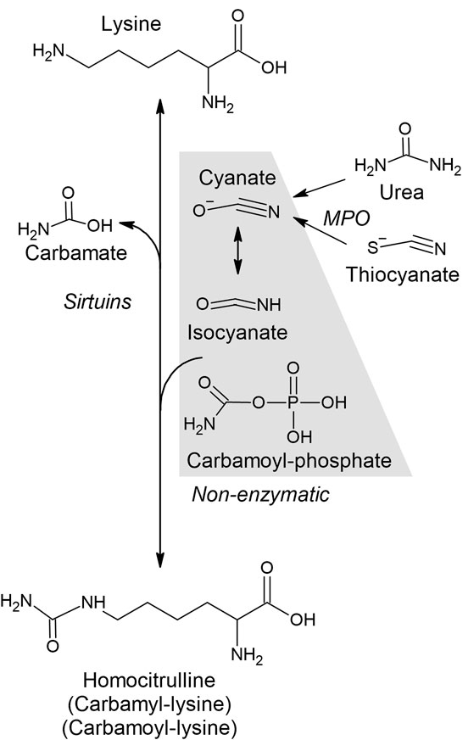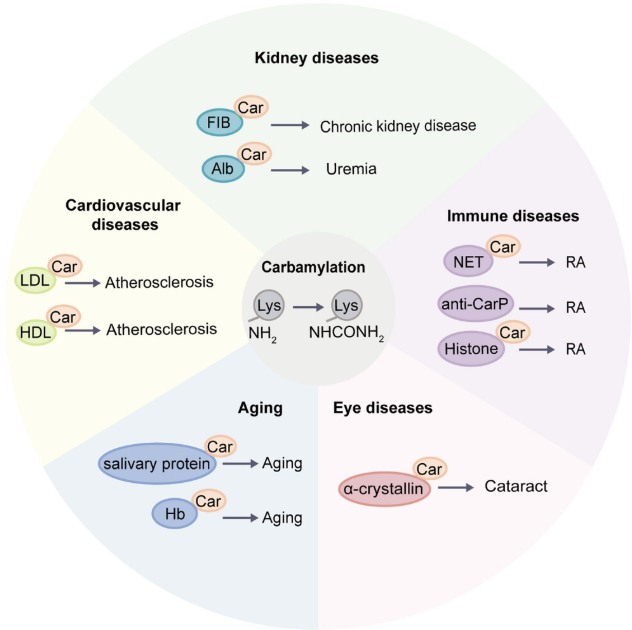Carbamylation Analysis Service
Carbamylation is a non-enzymatic post-translational modification that profoundly influences protein function and stability. By adding a carbamoyl group to amino acid residues, this process can alter protein charge, conformation, and activity, ultimately impacting cellular pathways and disease mechanisms. MtoZ Biolabs provides a comprehensive Carbamylation Analysis Service that enables precise detection, site-specific characterization, and quantitative evaluation of carbamylated proteins. Our service integrates state-of-the-art enrichment methods, high-resolution mass spectrometry, and bioinformatics-driven interpretation to deliver reliable and reproducible results. Whether the focus is on targeted protein studies or proteome-wide screening, our platform offers systematic solutions for advancing carbamylation research.
1. Target Protein Carbamylation Analysis
For projects centered on a specific protein, MtoZ Biolabs offers targeted carbamylation analysis to identify modified residues, quantify carbamylation levels, and compare modification status across experimental conditions. Selective enrichment and high-resolution MS enable accurate site confirmation and functional assessment.
2. Carbamylation Proteomics
For global profiling, our carbamylation proteomics workflow maps carbamylated proteins across complex biological samples using high-throughput sample preparation, LC–MS/MS acquisition, and comparative quantitative analysis. Integrated bioinformatics provides pathway enrichment and network-level interpretation of carbamylation events.
What is Carbamylation?
Carbamylation is a non-enzymatic post-translational modification that occurs when isocyanic acid, a reactive derivative of urea or myeloperoxidase-mediated oxidation of thiocyanate, covalently binds to amino acid residues. This modification commonly targets the ε-amino group of lysine residues or the N-terminal amino group of proteins, resulting in the formation of homocitrulline. Due to its non-enzymatic nature, carbamylation is strongly influenced by metabolic conditions, inflammatory responses, and oxidative stress. Several forms of carbamylation have been described. The most widely studied is lysine carbamylation, leading to homocitrulline formation, which alters protein charge and structure. N-terminal carbamylation modifies the exposed amino group at the protein N-terminus, influencing folding and stability.

You, Y. et al. Front Anal Sci. 2024.
Figure 1. Mechanism of Protein Carbamylation and Decarbamylation
Carbamylation has been extensively studied in the context of chronic kidney disease, where elevated urea levels promote widespread protein carbamylation, contributing to cardiovascular complications and immune dysfunction. It is also implicated in atherosclerosis, neurodegenerative diseases, and aging. At the molecular level, carbamylation can impair enzyme activity, disrupt protein-protein interactions, and promote protein aggregation. Despite its biological significance, the subtle mass shift associated with carbamylation (+43 Da) and its overlap with other modifications pose analytical challenges. High-resolution LC-MS/MS, combined with selective enrichment strategies, provides a powerful solution for precise detection and quantification.

Zhong, Q. et al. MedComm (2020). 2023.
Figure 2. Representative Protein Substrates and Roles of Carbamylation in Various Diseases
Analysis Workflow

Sample Submission Suggestions
1. Sample Types
Cell lysates, tissues, serum, plasma, or purified proteins.
2. Storage
Snap-freeze samples in liquid nitrogen and store at –80°C.
3. Shipping
Ship on dry ice to maintain modification stability.
4. Replicates
Biological replicates are recommended for statistical reliability.
For other sample types, we recommend contacting our technical team prior to preparation to ensure compatibility and optimal processing.
Service Advantages
✅ Precision: High-resolution MS ensures accurate site-level characterization of carbamylation.
✅ Sensitivity: Optimized enrichment and detection workflows allow identification of low-abundance carbamylated peptides.
✅ Comprehensiveness: We provide end-to-end solutions that cover the entire workflow, from sample preparation and peptide enrichment to mass spectrometry detection and data analysis.
✅ Customization: Tailored solutions adapt to the unique requirements of each project.
✅ Expertise: A dedicated team with extensive experience in proteomics and PTM research ensures reliable and reproducible results.
Applications
1. Disease Mechanism Studies
Profiling carbamylated proteins offers valuable insights into the role of this modification in chronic kidney disease, cardiovascular dysfunction, neurodegeneration, and metabolic disorders.
2. Biomarker Discovery
Carbamylation-derived peptides can serve as diagnostic or prognostic biomarkers, especially in kidney disease and related complications.
3. Drug Development and Therapeutic Evaluation
Monitoring carbamylation helps assess drug-induced modifications, therapeutic efficacy, and potential off-target effects.
4. Protein Function and Structure Analysis
Site-specific carbamylation mapping provides mechanistic understanding of how this modification alters protein folding, interactions, and enzymatic activity.
Deliverables
1. Comprehensive Experimental Details
2. Materials, Instruments, and Methods
3. Total Ion Chromatogram & Quality Control Assessment
4. Data Analysis, Preprocessing, and Estimation
5. Bioinformatics Analysis
6. Raw Data Files
Carbamylation continues to emerge as a key non-enzymatic modification with broad biological implications. By combining advanced platforms with rigorous workflows, MtoZ Biolabs enables researchers to obtain accurate, reproducible, and meaningful insights into carbamylation-driven processes. Contact us today to discuss your project and request a customized proposal!








